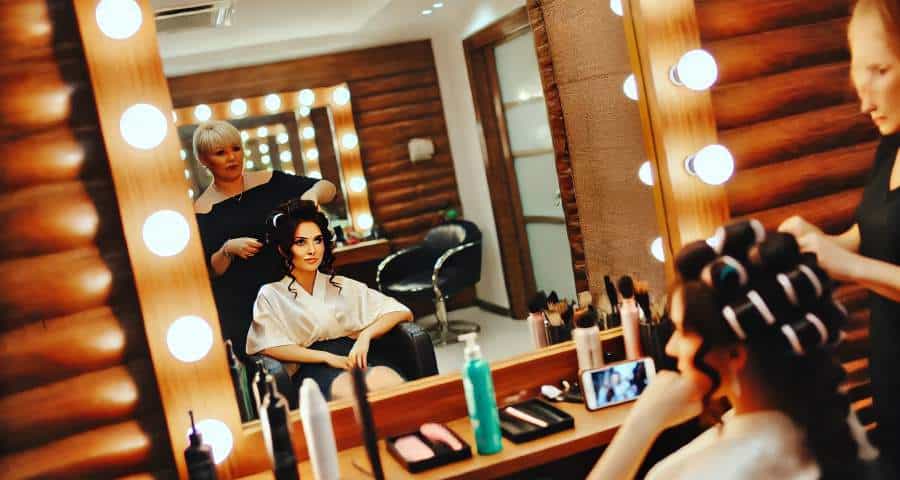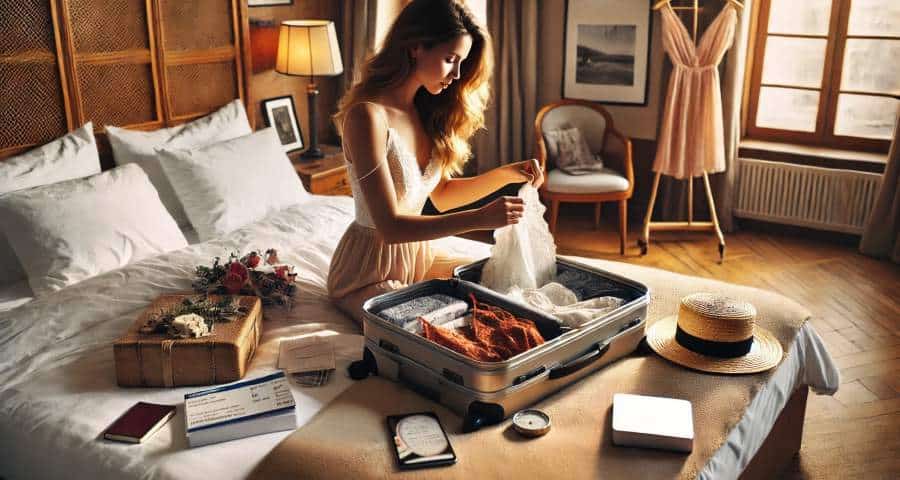Understanding the different phases of wedding planning can help you organise tasks efficiently, manage your time wisely, and enjoy the process leading up to your special day.
Every wedding is unique, and the amount of time between getting engaged and the wedding day varies for each couple.
I’ve broken down the wedding planning process into distinct phases, each with suggested timelines.
This approach allows you to identify where you are in your planning journey and focus your efforts accordingly. By dividing the process into manageable segments, you can ensure that you’ve covered all the tasks in each phase and know what to tackle next.
Dreaming & Deciding (Soon after getting engaged)

The initial phase after getting engaged, often referred to as the “Dreaming & Deciding” stage, is a critical time where the foundational elements of your wedding are conceptualised and set into motion. It’s a period filled with excitement, decision-making, and the beginning of turning your wedding dreams into reality.
- Announce Your Engagement: Share the great news with family and friends through your preferred method, celebrating this joyful milestone.
- Host an Engagement Party: Celebrate your engagement with a gathering, whether it’s an intimate family dinner or a larger event with friends.
- Set the Wedding Date: Choose a date that holds personal significance or offers logistical convenience, considering seasons and potential guest conflicts.
- Determine Financial Contributors and Budget: Discuss who will contribute financially and establish a budget that accommodates your vision, including a buffer for unexpected costs.
- Nominate Your Wedding Party: Select close friends and family members to support you on your special day.
- Decide on the Style and Theme: Define the aesthetic of your wedding, gathering inspiration through images and samples to bring your vision to life.
- Estimate Guest Numbers: Compile a preliminary guest list to guide venue selection and budget planning.
- Send Out Save-the-Date Invites: Ensure your guests reserve your wedding date by sending out notifications early, especially important for destination weddings.
- Book Your Venues: Secure your ceremony and reception locations early to ensure availability, matching them with your chosen theme and style.
- Choose Photographers and Other Recorders: Select professionals who align with your stylistic preferences and can capture the day as you envision.
- Prepare for Weather Variables: If planning an outdoor event, arrange for backup options like indoor venues or tents in case of inclement weather.
- Research Honeymoon Destinations: Start planning your post-wedding getaway by exploring exciting locations and travel essentials.
- Explore Premarital Counselling: Consider strengthening your future marriage through premarital counselling sessions.
- Develop a Record-Keeping System: Organise all wedding-related documentation for easy access and management.
- Maintain a Diary of Ideas: Document inspirations and thoughts throughout the planning process, creating a memorable keepsake.
Foundation Setting (6-12 months before)

During this time, you solidify the essential elements that will bring your wedding vision to life. This phase involves making significant decisions, booking key vendors, and ensuring that all foundational aspects are in place well ahead of your big day.
- Shop for Your Wedding Gown: Begin the exciting search for your perfect wedding dress. Starting early allows ample time for multiple fittings, alterations, and customizations if needed.
- Look for Outfits for Bridesmaids and Flower Girls: Coordinate styles and colors that complement your wedding theme. Ordering early ensures that all attire arrives on time and fits correctly.
- Try Different Hairstyles: Experiment with various hairstyles to find the one that suits you best. Consider scheduling hair trials with a stylist to see how different looks complement your dress and accessories.
- Book a Hair Stylist: Secure a professional hairstylist experienced in bridal hair to recreate your chosen style on the wedding day.
- Book a Makeup Artist: Find a makeup artist who understands your style preferences. Schedule a trial session to ensure you’re happy with the look.
- Book a Nail Technician: Arrange for manicures and pedicures for yourself and possibly your bridal party to ensure everyone’s nails are picture-perfect.
- Compile the Guest List: Finalise who you will invite to your wedding. This number will influence venue capacity, catering, and budget considerations.
- Book Entertainment: Choose and book your wedding entertainment, such as a band, DJ, or other performers. Popular entertainers can book up quickly, so secure them early.
- Book a Wedding Celebrant or Minister: Hire the person who will officiate your wedding ceremony. Meet with them to discuss the ceremony structure and any personalised elements you’d like to include.
- Decide on the Style of the Cake and Book a Cake Maker: Select the design and flavours of your wedding cake. Tasting sessions can help you decide. Book a reputable cake maker who can bring your vision to life.
- Book Necessary Transport: Arrange transportation for you, your wedding party, and possibly guests. Options might include limousines, vintage cars, or shuttles.
- Plan and Book Your Honeymoon: Decide on a destination that excites both of you. Book flights, accommodations, and activities in advance to secure the best deals.
- Organize Passports, Visas, and Inoculations: Ensure your travel documents are up to date. Research visa requirements and necessary vaccinations for your honeymoon destination.
- Obtain a Birth Certificate if Necessary: Check the legal requirements for marriage in your location. You may need certified copies of your birth certificates or other documents.
- Start a Health Program: Begin any fitness or wellness routines to look and feel your best on your wedding day. This could include joining a gym, starting a new diet, or practising mindfulness and stress-reduction techniques.
- Develop a Record-Keeping System: Create an organised system to keep track of contracts, receipts, and correspondence with vendors. This could be a physical binder or digital folder.
Details & Design (3-6 months before)

In the months leading up to your wedding, attention to detail is crucial. This phase focuses on refining the aesthetic elements, finalising arrangements, and infusing personal touches to make your day truly unique.
- Order or Create Wedding Stationery: Design your suite of wedding stationery, including invitations, RSVP cards, menus, programs, and thank-you notes. Consider DIY options for a personal touch, or select a professional designer.
- Design and Organise the Wedding Program: Detail the sequence of events, including special readings and musical selections. Personalise your program with quotes, anecdotes, or photos.
- Finalise the Wedding Guest List: Confirm your attendee list to assist with seating plans, catering orders, and accommodations.
- Book All Party Hire Equipment: Secure necessary items like tables, chairs, tents, lighting, and sound systems. Consider the style and theme of your wedding when selecting these.
- Select an MC (Master of Ceremonies): Appoint a confident speaker to guide the festivities, ensuring a smooth flow throughout the event.
- Choose the Florist and Select Flowers: Finalise your floral arrangements, selecting blooms that complement your theme and season.
- Book the Bridal Suite for the Wedding Night: Reserve a romantic location for your first night as a married couple, ensuring it has all the amenities you desire.
- Ensure All Deposits Are Paid and Contracts Signed: Keep track of payments and signed contracts with vendors to avoid any last-minute issues.
- Buy Shoes, Jewelry, and Other Accessories: Choose accessories that complement your attire, and wear your shoes to ensure they’re comfortable on the day.
- Begin Regular Facial Treatments: Start treatments to enhance your skin’s glow. Consult a professional for recommendations based on your skin type.
- Start Dancing Lessons: Whether it’s a simple waltz or a choreographed number, consider taking dance lessons to prepare for your first dance.
- Visit Your Wedding Officiant: Discuss ceremony details and complete the ‘Notice of Intended Marriage’ form or similar paperwork as required.
- Decide Upon a Gift Registry: Set up your registry and select gifts across various price points to suit all your guests.
- Select and Buy Wedding Favours: Create or choose favours that reflect your wedding theme and personal taste.
- Finalise Honeymoon Details: Check all bookings for your honeymoon, ensuring travel documents are in order.
- Determine Your Post-Wedding Living Arrangements: If moving into a new home, organise the necessary arrangements like leases and utilities.
Coordination Countdown (1-3 months before)

The Coordination Countdown phase, spanning from one to three months before the wedding, is all about confirming arrangements, coordinating with vendors, and preparing for the celebrations leading up to your big day.
- Confirm Floral Details: Finalise your selections for bouquets, boutonnieres, centrepieces, and other decorations with your florist, ensuring they match your wedding theme.
- Organise Pre-Wedding Parties: Plan the bachelor/buck’s/stag and bachelorette/hen’s parties. Decide on activities that reflect the preferences of the bride and groom.
- Plan the Bridal Shower/Kitchen Tea: Coordinate a celebration for the bride with gifts that will be useful for the home. Opt for a relaxed setting with close friends and family.
- Arrange Leave from Work: Ensure you and your wedding party have secured time off for the wedding and any related festivities.
- Visit a Financial Advisor: Discuss how to merge finances, manage budgets, and plan financially for the future as a married couple.
- Update Insurance Policies: Review and adjust your health, life, and property insurance policies to reflect your new marital status.
- Revise Legal Documents: Update or create new wills and consider any legal changes post-marriage.
- Organise Name Changes: If changing names, prepare the necessary documents for updates to IDs, bank accounts, and official records.
- Acquire Wedding Accessories: Purchase or finalise details like the garter, cake knife, toasting glasses, and guest book.
- Purchase or Borrow Items for the Ceremony: Secure a ring bearer pillow or special box for the rings.
- Meet with Your Photographer: Discuss specific shots, venue details, and any must-capture moments. Consider an engagement shoot if not already done.
- Send Out Invitations: Distribute your wedding invitations at least 6–8 weeks in advance, including all essential details for your guests.
- Finalise Ceremony Vows: Complete the wording for your vows, practising them to ensure smooth delivery.
- Coordinate Attire for Parents and Wedding Party: Confirm that all attire is appropriate and complements the wedding theme.
- Select and Confirm Groom and Groomsmen Outfits: Ensure all outfits are finalised, fitting well, and alterations completed.
- Design or Purchase Wedding Rings: Finalise your rings, allowing time for any necessary customizations like engraving.
- Provide a Playlist to Your DJ or Band: Hand over a list of preferred songs and any do-not-play tracks.
- Schedule Hair and Makeup Trials: Confirm your wedding day look with a trial run, making any necessary adjustments.
- Plan the Rehearsal Dinner: Organise this key event, choosing a venue, sending invites, and planning the menu.
- Watch a Wedding-Themed Movie: Relax and get inspired with a romantic film about weddings.
- Remind Wedding Party to Arrange Time Off: Ensure that all key participants have scheduled necessary leave for the wedding.
Fine-Tuning (1 month before)

As you approach the final month before your wedding, it’s time to fine-tune the details and ensure everything is in place for a smooth and memorable celebration. This critical phase involves confirming arrangements, finalising plans, and preparing yourself and your wedding party for the big day.
- Follow Up on RSVPs: Reach out to guests who haven’t responded to ensure an accurate count for seating arrangements and catering.
- Confirm All Vendors: Double-check details with the ceremony and reception venues, florist, DJ or musicians, MC, officiant, hair stylist, makeup artist, photographer, videographer, and any other vendors.
- Send Final Guest List to Venue: Provide the finalised guest list to your venue for meal and seating preparations.
- Apply for Marriage Licence: Ensure you understand local regulations and apply for your marriage licence, noting any waiting periods or expiration dates.
- Check Legal Documents: Verify that all necessary legal documents, such as birth certificates and IDs, are prepared for the wedding day.
- Inform Wedding Party of Their Responsibilities: Make sure everyone knows their roles, schedules, and what’s expected of them.
- Finalise Seating Arrangements and Place Cards: Arrange seating to accommodate relationships and guest comfort; prepare place cards.
- Schedule Final Wedding Gown Fittings: Ensure your gown fits perfectly, along with any accessories.
- Break in Your Wedding Shoes: Wear your shoes around the house to ensure they are comfortable.
- Pick Up Wedding Rings: Verify engravings and fit when you collect your rings from the jeweller.
- Celebrate with Pre-Wedding Parties: Enjoy your bachelor party/stag night and bachelorette party/hen’s night, ideally scheduled at least a week before the wedding.
- Hold Bridal Shower: Have a celebratory gathering with gifts that will be useful for your new home.
- Attend Rehearsal Dinner: Review last-minute details and express gratitude to your wedding party and family.
- Select Gifts for Wedding Party: Choose thoughtful gifts to thank those who helped plan and celebrate your wedding.
- Prepare Thank-You Notes: Start writing thank-you notes for guests and participants who have already contributed gifts or helped significantly.
- Schedule Haircuts and Beauty Preparations: Groom should have a haircut a week before, and final trials for hair and makeup should be scheduled to finalise the looks.
- Confirm Honeymoon Arrangements: Double-check all bookings and necessary travel documents for your honeymoon.
- Prepare Travel Funds: If travelling abroad, arrange for traveller’s checks or exchange currency as needed.
- Finalise Ceremony Music: Choose and confirm songs for the processional, signing of the register, and recessional.
- Organise Wedding Rehearsals: Ensure everyone involved in the ceremony knows their placement and roles.
- Complete Vow Writing: Finalise the wording of your vows, practising them to ensure smooth delivery on your wedding day.
Last Minute Touch-ups (1 week before)

With just one week left before you say “I do,” it’s time to focus on the final details that will ensure your wedding goes off without a hitch. This last stretch is all about tying up loose ends, pampering yourself, and preparing both mentally and physically for the celebration ahead.
- Confirm Attire Fittings: Collect and try on your wedding dress, suit, or tuxedo to ensure the perfect fit. Confirm that all bridal party members have their outfits ready and properly tailored.
- Nail Care: Schedule professional manicures and pedicures for a polished look. Choose durable nail treatments to maintain your manicure through the honeymoon.
- Relaxation Time: Book a massage or spa day to relax and destress. This helps ensure you’re refreshed and radiant for your big day.
- Pack for the Honeymoon: Start packing early to ensure you have everything you need, from travel documents to appropriate clothing.
- Prepare an Emergency Kit: Assemble a kit with essentials like safety pins, tape, scissors, band-aids, and a sewing kit. Include backup makeup and snacks for energy.
- Gather All Rental Items: Collect any rented or borrowed decor or equipment needed for the wedding.
- Pack for the Wedding Day: Include personal items like your marriage licence, rings, vows, and a change of clothes. Add comfort items such as flats for dancing.
- Clarify Roles and Responsibilities: Ensure everyone involved knows their specific duties for the day.
- Final Facial Treatment: Have your last facial treatment early in the week to allow your skin to adjust and glow.
- Finalise Guest Count: Provide the latest headcount to your caterers and venue to finalise the seating plan and meal arrangements.
- Practise Your Speeches: Review and rehearse any speeches or toasts, keeping them concise and personal.
- Confirm Vendor Details: Double-check delivery times and specifics with all your vendors to ensure everyone is on the same page.
Remember, while this timeline provides a general structure, every wedding is unique. Feel free to adjust these phases to fit your specific needs and timeline. The key is to stay organised, communicate clearly with your partner and vendors, and most importantly, enjoy the journey to your special day!

